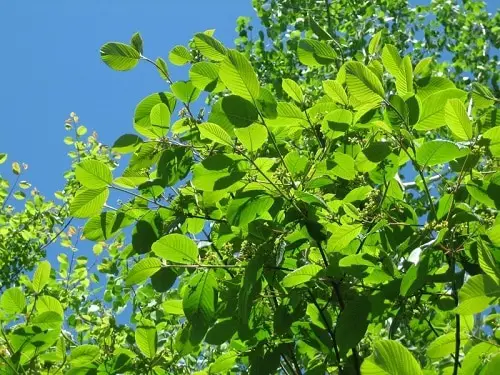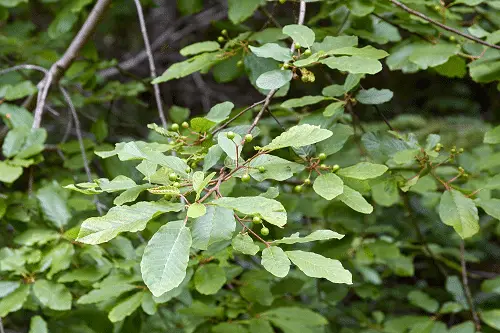This article contains all the basic planting, caring, and Cascara Tree Growing Information that is going to help you have your own!

Cascara Tree is a favorite of birds that feed on its purple fruits. It grows up to 15-30 feet tall and looks beautiful in gardens. If you too want to grow it, then here’s a complete guide on Cascara Tree Growing Information.
Botanical Name: Rhamnus purshiana
Common Names: Sacred Bark, Cascara Sagrada, Chittem Bark
USDA Zones: 4-10
Check out our article on growing Guava tree here
Cascara Tree Growing Information
Cascara Tree is native to the Buckthorn family that comes from western North America from southern British Columbia to central California, Idaho, and Montana. It bears purple-colored fruits and small flowers that feed several birds. This highly overlooked tree has the potential to adapt to any growing conditions and could be a good choice for a smaller yard.
With thin, dark, gray-black bark, its foliage turns into a shade of brilliant yellow in autumn. This tree grows well in different soil and sun conditions but thrives best in a partly sunny place with well-drained soil.
Growing Requirements of Cascara Tree
- Growth Rate: slow, 20-24 inches per year
- Maturity size: 28-30 inches tall, 18-20 inches wide
- Layer: Small Tree
- Sun Requirements: Full Sunlight to full Shade
- Moisture Needs: Evenly moist soil
- Uses: Medicinal supports hummingbirds
Cascara trees are an excellent choice for smaller yards or where large tees would not be able to grow best. It is stunning to look at, has high drought tolerance, but it is sensitive to toxic gases. So, it is best to keep the tree away from busy roads and highways.
Cascara Tree Identification Facts

So, how can you spot and identify a Cascara Tree? Here’s a list of characteristics that you can look for.
- Leaf Color: Dark green on the outer side and light green on the inner: alternate and clustered near the ends of twigs
- Taste: Bitter
- Odor: None to faint
- Bark: Thin, smooth, silver-grey bark with deeply-ridged oval-shaped leaves
- Category: Erect, tall shrub, or small tree
- Height: 30-33 feet (or 10-12 meter) tall
- Width: 15 feet (or 4-4.5 meter)
- Flowers: Small, green-yellow, or green-white in color
- Fruits: Edible, blue-black to purple-black berries
- Buds: Naked, not covered by scales
- Stems: Erect with rounded branches
- Foliage: Deciduous
Cascara Tree Uses
The anthraquinones in Cascara sagrada are known mainly for their ability to treat constipation. Some sources even point out that they could be used in stimulating liver health. Besides being used as a laxative to ease constipation, and treat gallstones, some people also use it as a bitter tonic to promote health.
- Aids in Weight Loss
- Can Heal Parasitic Infections
- Help ease digestive problems
- Treats dysentery
- Might help treat hemorrhoids, fissures
- Might ease joint and muscle pain
- Helps to Heal acne & patchy skin
- Stimulates healthy hair and prevents hair fall
- Beneficial for glowing, youthful skin because it possesses hydrating and anti-aging elements
- Adds flavor to soft drinks, ice cream, liquors, and baked goods



Hi there! Under Growth Requirements and next to Maturity Size, I think that should say feet instead of inches.